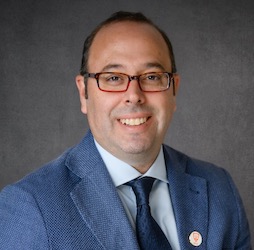Graduate Student Seminar
January 19, 2024
10:00 a.m. ET
Doherty Hall 2210
January 19, 2024
10:00 a.m. ET
Doherty Hall 2210
The focus of this presentation will be the interdisciplinary nature of concepts encountered in a broad range of application areas ranging from solid oxide fuel cell and battery materials development where “enhancement” of ionic or electronic transport is desired to contemporary work in nuclear waste immobilization with a focus on “blocking“ transport of mobile species. Solid oxide fuel cells (SOFCs) are promising sustainable energy systems with high efficiency, fuel flexibility, and limited byproducts. Proton-conducting SOFCs (H-SOFCs) has attracted increased interest in recent years due to the lower working temperatures (400-700 ̊C). Triple ionic-electronic conductors (TIEC) such BaCo0.4Fe0.4Zr0.1Y0.1O3-δ (BCFZY) have received much attention as high performance electrode materials for protonic ceramic fuel cells (PCFC). The conduction of all three species makes TIECs excellent candidates as cathodes in PCFCs due to their high activity, good stability, and facile synthesis routes.
In contrast, crystalline ceramic candidates have been proposed as alternatives to vitreous nuclear waste forms for their ability to trap and “block” elemental release. In the late 1970s, SYNROC, short for synthetic rock, was developed to immobilize high-level nuclear waste (HLW). The hollandite mineral group is one of the most studied as a template for SYNROC materials and includes the titanate mineral forms of hollandite. Correlations will be examined between the thermodynamic stability and physical properties such as elemental release for the crystalline hollandite ceramic waste forms and ionic transport in battery and fuel cell materials which may be used in the design of future energy materials.
 Brinkman received a Bachelor of Science in chemical engineering and a Master of Science in materials science and engineering both from Clemson. He graduated from the Swiss Federal Institute of Technology in Lausanne, Switzerland with a Ph.D. in materials science and engineering. Brinkman then served as a postdoctoral fellow at the Advanced Industrial Science and Technology Institute in Japan as part of a program sponsored by the Japanese Society for the Promotion of Science and later worked as a principal engineer in the Science and Technology Directorate of the U.S. Department of Energy’s Savannah River National Laboratory.
Brinkman received a Bachelor of Science in chemical engineering and a Master of Science in materials science and engineering both from Clemson. He graduated from the Swiss Federal Institute of Technology in Lausanne, Switzerland with a Ph.D. in materials science and engineering. Brinkman then served as a postdoctoral fellow at the Advanced Industrial Science and Technology Institute in Japan as part of a program sponsored by the Japanese Society for the Promotion of Science and later worked as a principal engineer in the Science and Technology Directorate of the U.S. Department of Energy’s Savannah River National Laboratory.
He was the recipient of the Minerals, Metals and Materials Society TMS Brimacombe Medalist Award (2020) and the Navrotsky Award for Experimental Thermodynamics of Solids from The American Ceramic Society (2023). He is a Fellow of the American Ceramic Society (ACERS) 2020, Academician with the World Academy of Ceramics (2023), and Fellow of the Royal Society of Chemistry (2023).
July 8 2025
1:00 PM ET
Materials Science and Engineering
"Uncovering the Driving Force of Thermal-Activated Grain Boundary Migration in Polycrystals," presented by Zipeng Xu
Doherty A310
July 29 2025
11:00 AM ET
Materials Science and Engineering
Graduate Programs Information Session
Learn more about the master's and doctoral programs in materials science and engineering at CMU.
August 13-15 2025
Materials Science and Engineering
Workshop on Methods for Three-Dimensional Microstructure Studies
The workshop is intended for researchers at all levels and will combine presentations on 3D microstructure science as well as practical presentations on the tools and methods for reconstructing, analyzing and synthesizing.
Scott Hall 5201 (Bosch Sparks Conference Room)